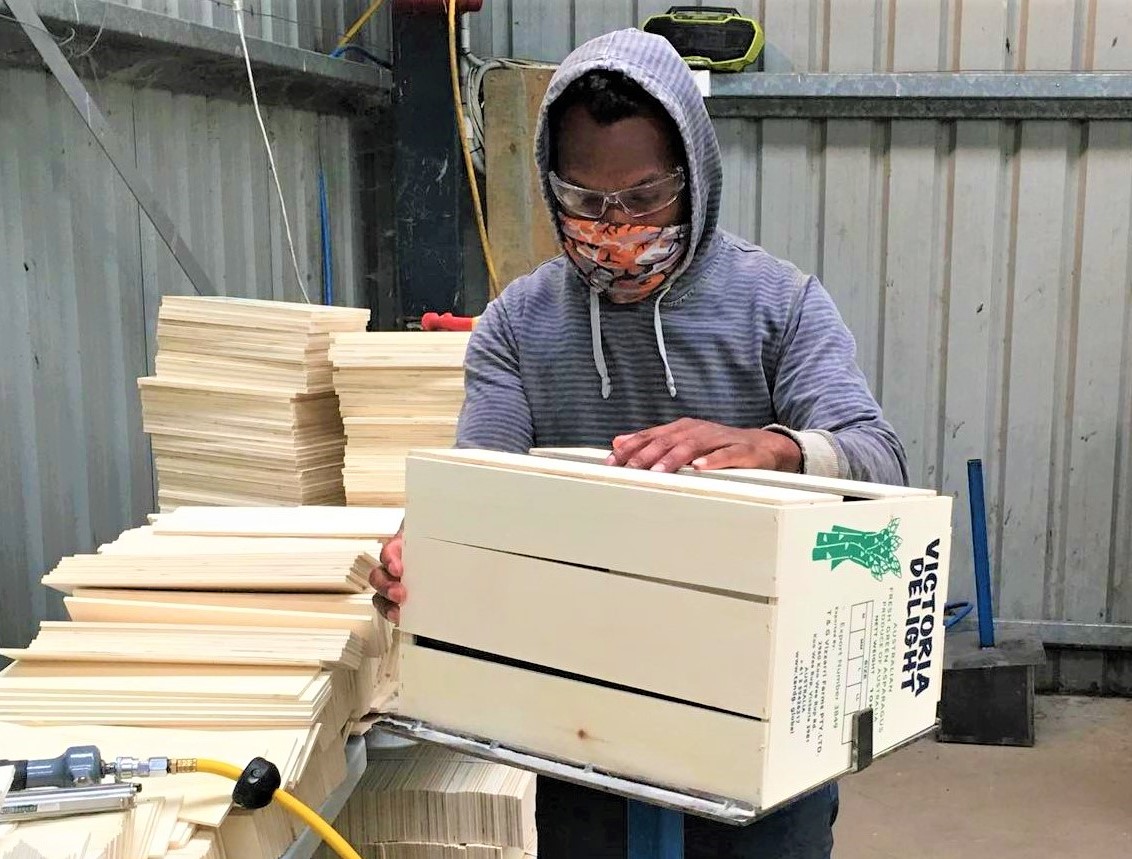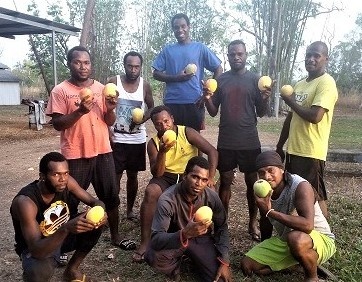
Growers are required to have COVID-19 management plans in place to protect seasonal workers (Jeremiah Naupa)
The NT seasonal worker pilot: managing worker safety in the COVID-19 era
By Charlotte Bedford and Rochelle Bailey
21 August 2020
On 4 August the Australian and Northern Territory governments announced a small pilot that will initially bring in 170 ni-Vanuatu workers under the Seasonal Worker Programme (SWP) to provide labour for the upcoming mango harvest, with the potential for more ni-Vanuatu workers to follow.
The trial will be welcome news for mango producers, who have been lobbying hard for access to Pacific or Timorese labour to help address a looming labour shortage of between 800 and 1,000 workers, and for Vanuatu which, prior to the COVID-19 pandemic, was the largest supplier of SWP workers to Australia. Similarly, it is good news for the other countries that participate in the SWP, as the pilot raises the prospect of additional seasonal work opportunities in future. These countries will also be looking to re-engage in seasonal labour mobility as a means of generating income and remittances to support island-based families and communities.
The pilot will be watched closely by New Zealand, which has a similar seasonal worker program and is yet to open up any pathways for Pacific seasonal workers to re-enter the country. It will also be of interest to commentators who have been advocating for a loosening of restrictions in Australia, along the lines of the exemptions for seasonal workers seen in Canada and Germany (see here, here, and here). The Vanuatu Commissioner of Labour has welcomed the pilot as a great opportunity for Vanuatu, while emphasising that protecting workers’ health and wellbeing in Australia will be paramount.

Quarantine on arrival
Stringent health and safety conditions will be in place from the outset. The ni-Vanuatu workers will be kept in a ‘biosecurity bubble’ on the flight from Vanuatu to Darwin, via Cairns, and will not disembark the plane during transit. On arrival in Darwin, the workers will go into a mandatory 14-day quarantine period in a managed facility – a former village for gas employees at Howard Springs near Darwin. The upfront costs of participation are significant; workers’ return airfares from Vanuatu to Darwin will cost up to $1,500 and the cost of two weeks in quarantine is $2,500 per worker. For 170 workers, that’s a total cost of $680,000.
Approved Employers (AEs) involved in the pilot are covering 75 per cent of the upfront costs, with workers paying a maximum of $1,000 each for their airfares. The Northern Territory mango season is relatively short, with peak harvest from October to December. AEs are keen to engage the ni-Vanuatu workers for nine months (the maximum allowed on the SWP visa), potentially moving them interstate for other horticultural work once the mango season has finished. Moving interstate may involve additional quarantine requirements, the costs of which will need to be carefully managed for both AEs and workers.
Workers’ health and safety
For the ni-Vanuatu workers there is minimal risk of contracting COVID-19, with no reported clusters of cases among SWP workers in Australia. The Northern Territory has no active cases of COVID-19 as of 19 August, no evidence of community transmission, and has quarantine requirements for travellers from Victoria and parts of New South Wales where there are increasing numbers of new COVID-19 cases. The current COVID-19 outbreak in Victoria is, however, evidence of the evolving nature of the epidemic and the need for a robust response strategy. In the unlikely event of a positive diagnosis, a rapid response will be required to test, trace, isolate and support the worker and any immediate contacts.
Canada and Germany
Canada and Germany are two countries that have allowed for ongoing recruitment of foreign seasonal workers during the COVID-19 pandemic, despite far higher COVID-19 cases than seen in Australia. Overall, the arrangements have worked well, and the special pathways put in place have been supported by farmers and food processors facing labour shortages. However, there have been some outbreaks of the virus among their seasonal workforces. Overcrowded conditions in the workplace, daily transport to/from work and in accommodation sites, as well as a lack of appropriate personal protective equipment such as masks have facilitated the spread of the virus. Both countries (see here and here) responded to the outbreaks with a range of additional protection measures including increased testing and tracing capacity, new rules around worker accommodation, heightened health and safety requirements on worksites, additional farm site inspections, support and education for workers, and sanctions on non-complying farms. These enhanced protection measures have helped to contain the virus, although instances of COVID-19 among seasonal workers continue to be reported.
Health and safety measures
For the ni-Vanuatu workers coming for the mango harvest, the risk of infection is extremely low. Nonetheless, the communal aspect of seasonal work, where workers tend to live and work in close proximity, could make seasonal workers susceptible to a viral illness that is spread through close contact. To manage this risk, various health and safety measures are being implemented.
All AEs involved in the pilot have an individual COVID-19 management plan which has been approved by the Northern Territory Chief Health Officer. The plan covers arrangements in workers’ accommodation, transport to/from work and the worksite, and outlines social distancing and hygiene measures, as well as criteria for monitoring, identifying, reporting and managing a confirmed case of COVID-19 in the unlikely event a worker becomes unwell. Management plans include keeping the ni-Vanuatu workers separate from other work teams on the orchard, and visitors are not allowed at the workers’ accommodation.
The ni-Vanuatu workers will be provided with extensive pre-departure and on-arrival training on what to expect when travelling to/from the worksite and working in Australia during current COVID-19 restrictions. Training includes information on how the virus spreads, hygiene, social distancing measures in the workplace and outside of work, and what to do if workers feel unwell. As reported here, there is a risk workers may not seek medical treatment even if they feel unwell, to avoid taking time off work and forfeiting their daily earnings. AEs recognise that clear communication with workers is essential to ensure workers understand where and when to seek medical help if needed. One AE, for instance, has developed an App specifically to enhance communication and education with their workers. Regular communication with families at home is also critical to reassure family members that workers are safe.
AEs are developing options for workers to undertake some of their out-of-work activities online, rather than in the local community. These include online supermarket shopping, online banking services to send money home, and online recreational activities, and workers will receive training in how to access and use them.
Opportunities for religious observation are crucial for workers’ spiritual wellbeing. Churches in the Northern Territory have been open for worship since May and workers can attend church services in the community. Church services are also available online. The Pacific Labour Facility has a list of live-streamed church services, run in Australia and the Pacific, available on their Facebook page. These sorts of activities should be promoted to workers as they will play an important role in maintaining workers’ social interactions with others outside the workplace without requiring workers to engage directly with members of the local community if they prefer not to.
As noted above, all AEs have an individual COVID-19 management plan in place. Regular communication within this group and with the relevant authorities will help ensure the plans are implemented, and lessons are learnt.
There is no dispute that the Northern Territory trial is good news for the Australian mango industry and for Vanuatu. Depending on the experiences with the trial, it is also possible other states may look to follow suit with their own initiatives. The success of this trial will be measured largely by the extent to which it protects the health and wellbeing of the ni-Vanuatu workers. While the risks are extremely low, there is no room for complacency.
This post is part of the #COVID-19 and the Pacific series.
About the author/s
Charlotte Bedford
Charlotte Bedford is a research fellow with the Development Policy Centre and is based in New Zealand.
Rochelle Bailey
Rochelle Bailey is a Research Fellow at the Department of Pacific Affairs, ANU.
